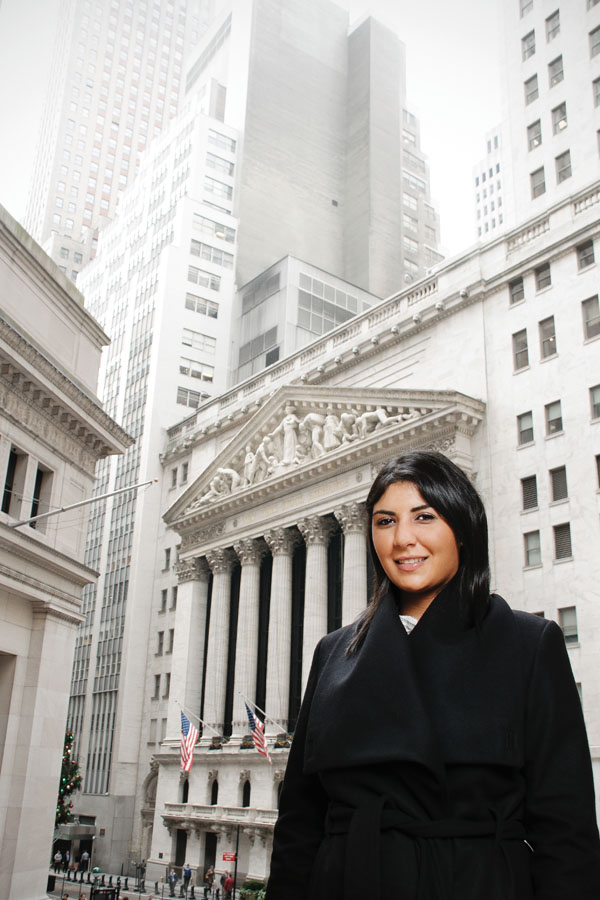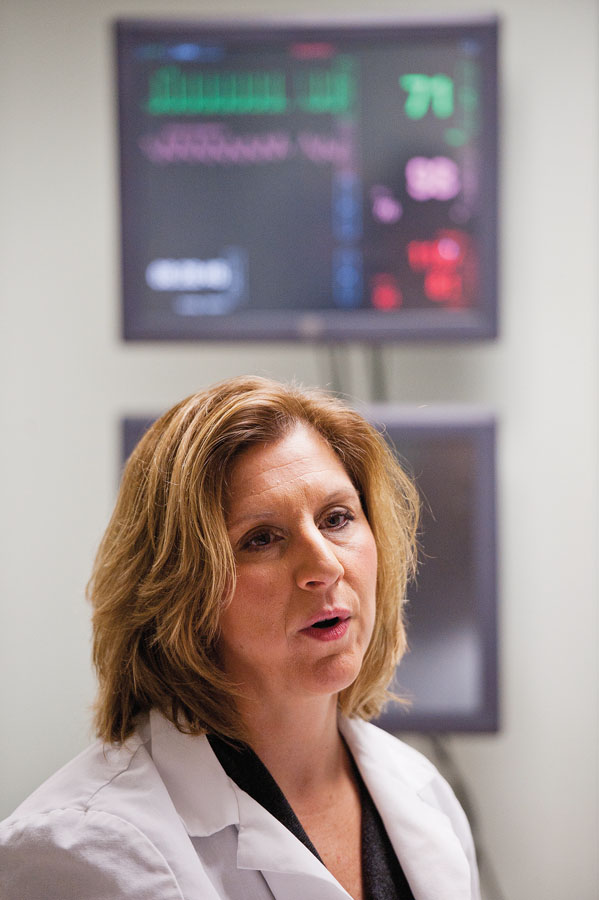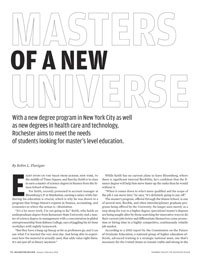Features
 FINANCIALLY CENTERED: Raquel Antonious ’06, a student in the Simon School’s new Manhattan-based master’s program in finance, says the location of the program is key. “I want to stay in New York, and the network here is very powerful.” (Photo: Shannon Taggart for Rochester review)
FINANCIALLY CENTERED: Raquel Antonious ’06, a student in the Simon School’s new Manhattan-based master’s program in finance, says the location of the program is key. “I want to stay in New York, and the network here is very powerful.” (Photo: Shannon Taggart for Rochester review)Eight stops on the train from Queens, New York, to the middle of Times Square, and Barclay Keith is in class to earn a master of science degree in finance from the Simon School of Business.
For Keith, recently promoted to account manager at Bloomberg L.P. in Manhattan, earning a salary while furthering his education is crucial, which is why he was drawn to a program that brings Simon’s experts in finance, accounting, and economics to where the action is—Manhattan.
“It’s a lot more work, I’m not going to lie,” Keith, who holds an undergraduate degree from Kennesaw State University and a master of science degree in management with a concentration in global entrepreneurship from Babson College, says of juggling his 10-hour workdays with nightly homework.
“But they have a bang-up lineup as far as professors go, and I can use what I’ve learned the very next day. Just being able to experience how the material is actually used, that adds value right there. It’s not just all in theory anymore.”
While Keith has no current plans to leave Bloomberg, where there is significant internal flexibility, he’s confident that the finance degree will help him move faster up the ranks than he would without it.
“When it comes down to who’s more qualified and the scope of the job I can move into,” he says, “it’s definitely going to pay off.”
The master’s program, offered through the Simon School, is one of several new, flexible, and often interdisciplinary graduate programs being offered by the University. No longer seen merely as a step along the way to a higher degree, specialized master’s degrees are being sought after by those searching for innovative ways to do their current jobs better and differentiate themselves come promotion or hiring time in a highly competitive, continuously volatile job market.
According to a 2010 report by the Commission on the Future of Graduate Education, a national group of higher education officials, advanced training is a strategic national asset, one that’s necessary for the United States to remain viable and strong in the 21st century. The report calls for state and national efforts to increase graduate school enrollment.
For its part, the University has added several new master’s degrees over the past two years, ranging in fields from business to health care to engineering and literary translation.
“It’s about offering the opportunity to get a deeper appreciation and understanding of a particular field,” says Wendi Heinzelman, dean of graduate studies for Arts, Sciences, and Engineering. “And one of the advantages of having a wide range of unique programs is that they appeal to a diverse group of students.”
Structured for working professionals, the 13-month, part-time MS in finance program includes 10 courses in midtown Manhattan on alternate weekends and two weeklong programs, one at the University’s campus in Rochester and another in Europe. And with approximately 3,000 alumni in the tri-state area, the program also offers opportunities for networking, mentoring, and support.
Of the 19 students in the inaugural class, which will graduate this spring, at least five have already started new jobs or been promoted.
“People recognize the Simon brand and come to us for a rigorous and highly respected degree,” says Janet Anderson ’90S (MBA), director of Simon’s part-time programs, both in Rochester and New York City. “To be able to get that while continuing to work in New York City, the globally accepted mecca of finance, is a real strength for their résumé.”
Raquel Antonious ’06, who majored in mathematics and statistics as a Rochester undergraduate, enrolled in the program to broaden her résumé after spending three years in equity research. “I knew I wanted to stick to the financial sector, but I felt like I specialized so early, and that there was more for me to learn,” she says. Antonious has since moved into financial management consulting at KPMG, and predicts the degree will guarantee her a lengthy, upwardly mobile career in Manhattan.
“It does give us a lot of leverage,” she says. “I want to stay in New York, and the network here is very powerful. I can’t tell you how much I appreciate this opportunity.”
Jack Chang ’09, who earned an undergraduate degree in optical engineering, has equal appreciation for his master of science in technical entrepreneurship and management, or TEAM, degree, which he says was the reason he started fielding job offers four months before graduation in 2010. The hybrid degree, jointly administered by the Hajim School of Engineering and Applied Sciences and the Simon School, combines the latest advances in both engineering and business.
“I was prepared more holistically, which made me a better candidate,” he says.
Two months before earning his graduate degree, Chang secured a job as a supporting sales engineer with a Rochester-based manufacturer of high-end optical components. He has since taken another job designing optical filters, hoping that the niche work will ultimately translate into a new business.
“To stimulate an economy, you need a more entrepreneurial mindset,” he explains. “You need to have more people who are willing to take risks, and that’s where TEAM plays an essential role.”
TEAM students create business plans to commercialize patented technology from the University’s Offices of Technology Transfer, compete and apply for start-up funding, and have the potential to launch their own businesses based on University technologies.
Seventy-five percent of graduates from the Class of 2010 received multiple job offers before receiving a diploma. The Class of 2011 had its own impressive statistics, with every graduate placed either in a full-time job, an internship, or a continuing education program.
 EXPANDING ROLES: A student in the University’s new master’s degree in health professions education, Christine Arnold is also a nurse who teaches in the School of Nursing. (Photo: Adam Fenster)
EXPANDING ROLES: A student in the University’s new master’s degree in health professions education, Christine Arnold is also a nurse who teaches in the School of Nursing. (Photo: Adam Fenster)“It’s not just about business savvy, and it’s not just about technical research,” says TEAM executive director Andrea Galati ’05, ’11W (MS). “It’s about being well-versed in two different languages.”
Matt Munderville ’07, a 2011 TEAM graduate, says that bilingualism is responsible for much of his success at a start-up company in Pristina, Kosovo, where he’s working to bring small-scale wind power to rural farms. He has developed a clear financial plan for the company, which he presents to development groups and potential local investors.
“The program really focuses on giving students the tools necessary to tackle the unknown in a structured manner,” says Munderville, who was a physics and English double major as an undergraduate. “TEAM helped me develop an intuition I can rely on, and a résumé that lets others know that they can rely on it, too.”
Interest in the program is growing. The number of applications grew from 75 to 140 in the last year, and given that prospective students began sending in applications in September for the 2012–13 academic year, the program is on track to grow even more.
“You’re always going to need people who are real specialists, who can do a deep dive into an area or discipline,” says Duncan Moore ’74 (PhD), vice provost for entrepreneurship. “But these students understand the market opportunities at the same time, so they’ll be much better at doing that deep dive. That’s what will differentiate them in the marketplace.”
With market opportunities increasing all the time in the swiftly expanding health care field, Christine Arnold, both a student and a nurse currently teaching at the School of Nursing, enrolled in the master of science in health professions education program to develop a more sophisticated level of expertise. Rochester is the first university in the region and one of a small number worldwide to offer the comprehensive, interdisciplinary master’s degree.
Raised in a culture of lectures and written exams that she says was more about convenience than education, Arnold appreciates an integrated approach that has her learning alongside doctors, physical therapists, occupational therapists, dentists, and other health care professionals.
“A lot of medical professionals are trained separately in silos, and then we throw them together and say, ‘OK, take care of this patient as a team,’ and they’re not well-equipped to do that,” she says. “This program goes a long way in promoting professional collaboration, increasing communication, and leveling the hierarchy that’s in health care right now. I’m not intending to go anywhere soon, but I certainly have become a much more competitive and valuable candidate with this education behind me.”
Up and running for about a year and developed by the Warner School of Education, the School of Nursing, and the School of Medicine and Dentistry, the health professions education program draws on faculty from each of the schools, and all courses are aimed at helping students become more effective teachers, faculty members, professional development providers, and patient and family educators. The idea is that by focusing on how people learn, their efforts will have a far greater impact.
“This is a very nontraditional way of thinking about teaching in education,” says Raffaella Borasi, dean of the Warner School. “We recognized the need for complementary expertise, which is an important piece for the next generation of practitioners.”
The demand for such candidates is expected to escalate as hospitals and other health care institutions turn more and more to the business world for its expertise in cost and quality control.
In response, Rochester is offering an MS in business administration with a concentration in medical management that’s geared toward students with few to no years of work experience. The program is in addition to Simon’s long-running part-time program for more seasoned professionals. With close connections to Strong Memorial Hospital and other local health care institutions, both programs allow students to use what they learn in the classroom to help medical professionals solve real dilemmas.
“For younger candidates with less work experience, the new degree will go a long way to helping them land their first position,” says Samuel Ogie, director of the Simon School’s programs in the health sciences.
The MS in biomedical engineering with a concentration in medical technology innovation, one of the University’s newest offerings, is another nod to the increasing demand for collaborative expertise in the workplace. Launched this year with a focus on cardiovascular device design, the program is expected to expand across fields of medicine
“Historically, there has been a big hole in combining biomedical engineering and medical center technologies,” says Pia Bunton, recruiting and marketing manager for graduate programs in Arts, Sciences, and Engineering. “A student coming out of this program will have all the knowledge to make a real impact on the medical device field.”
And taking cooperative learning to a new level, Rochester Institute of Technology and the School of Medicine and Dentistry have teamed up to offer a master of science degree in medical informatics. The degree combines the computing strength of RIT’s College of Computing and Information Sciences and the expertise of the medical school—an attractive mix to employers.
Eight students are enrolled in the program, which began in September and is the first joint degree offered by the two institutions.
“With the tremendous uptick in the implementation and acquisition of electronic health records by providers, offices, and medical centers, the need for qualified ‘health informaticists’ who understand how to improve health care through the use of technology has skyrocketed,” says David Krusch, chief medical information officer, director of medical informatics, and professor of surgery and informatics at Rochester. He adds that the program is designed to give students “a practical, applied working knowledge” of the skills required to meet that need.
Providing such a grounded understanding of a new field is a key element of other new degree programs at the University.
A new master of science program in alternative energy targets the increasing demand for development of sustainable energy through solar cells, fuel cells, biofuels, and nuclear fusion, using the chemical engineering faculty’s strong research programs in advanced materials, biotechnology, and nanotechnology.
Meanwhile, the master of arts in literary translation studies program includes a requirement to complete a book-length translation of publishable quality, an important skill as global boundaries shrink and access to foreign literature becomes more important.
“Only 3 percent of literary works published today are works in translation, and we’re trying to remedy that,” says Thomas DiPiero, dean for humanities and interdisciplinary studies. “There is so much literature being published every year, partly influenced by the speed of communication, and we’re past the period in which the only thing that matters are Western languages.”
The need for leading-edge education isn’t diminishing anytime soon.
“We’re going to stay at the forefront of the trends,” says Heinzelman, the dean of graduate studies for Arts, Sciences, and Engineering, “and develop new degrees that meet evolving demands.”
Robin L. Flanigan is a Rochester-based freelance writer.

